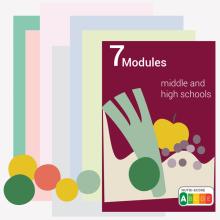
Teachers' Kit
The FEAST Education Kit provides ready-to-use resources for middle and high school teachers to facilitate sustainable food education. It features seven thematic modules containing slide packages, a dedicated activity booklet, and teacher-focused booklets that outline lesson objectives and key points. Designed for flexibility, each 60-minute module can be integrated into science or nutrition curricula.
We value your input to improve these tools—thank you for sharing your feedback!
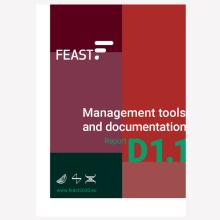
Management tools and documentation
The document provides the foundation for the project’s management structure, ethical compliance, and open-science implementation. See all documents here: https://zenodo.org/records/15512346
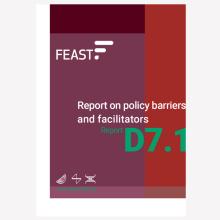
Report on policy barriers and facilitators
The report examines power dynamics among stakeholders in the food system and analyses how their framings shape food system policies, often acting as barriers or facilitators in the transition toward healthier and more sustainable diets.
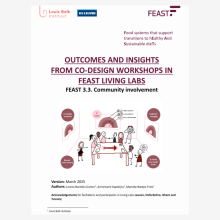
FEAST - Community involvement
Outcomes and insights from co-design workshop in FEAST Living Labs
This report presents the outcomes, insights and reflections from a series of co-design workshops conducted within four FEAST Living Labs—Leuven, Oxfordshire, Ghent and Tuscany—aimed at developing community-driven solutions that support healthier and more sustainable food choices.
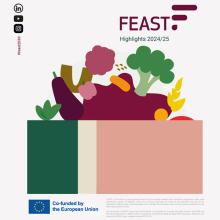
3rd Year Highlight
FEAST is growing, and so is our impact. This third-year highlight report showcases our refined strategy, innovative initiatives, and value-driven partnerships, all driving significant change in the European food system. Download it now to see our achievements, progress, and expanded initiatives as we accelerate toward a future where progress and purpose meet.
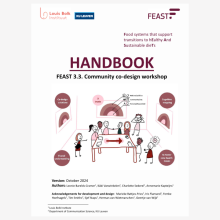
Community co-design workshop HANDBOOK
The FEAST WP3.3 Co-design workshop handbook provides a comprehensive, practice-oriented guide for facilitators who aim to engage communities—especially vulnerable groups—in co-creating solutions that support healthier and more sustainable food choices.
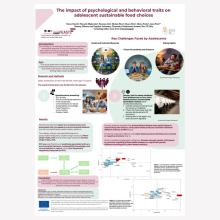
Conference poster – EFFOST2025
The EFFoST2025 conference explored the theme “Fostering the Transition to Sustainable Food Systems: Embracing Novelty and Overcoming Challenges”.
Luisa Torri and Chiara Chirilli from the Università di Scienze Gastronomiche di Pollenzo presented FEAST results in two poster sessions.
- A study to explore adherence to the EAT-Lancet planetary health diet in 27 European countries.
- The impact of psychological and behavioral traits on adolescent sustainable food choices.
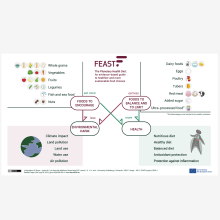
ELFI Infographic
We developed in this study (https://doi.org/10.1016/j.tjnut.2025.06.018) a simple tool to measure how closely people’s diets align with the Planetary Health Diet, a way of eating that is proposed to promote health and shown to be better for the environment.
This infographic is a visual summary of the ELFI tool, showing which foods are better for health and the planet and how current eating habits compare to these goals.
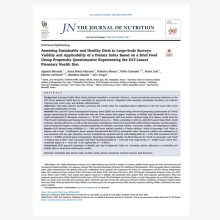
Assessing Sustainable and Healthy Diets in Large-Scale Surveys:
Validity and Applicability of a Dietary Index Based on a Brief Food Group Propensity Questionnaire Representing the EAT-Lancet Planetary Health Diet
This study published in the The Journal of Nutrition aimed to develop a practical and concise index for evaluating relative adherence to the EAT-Lancet diet across large-scale multicountry surveys. The EAT-Lancet Consumption Frequency Index (ELFI), is a brief, practical tool to assess adherence to the EAT-Lancet diet in large surveys. https://doi.org/10.1016/j.tjnut.2025.06.018
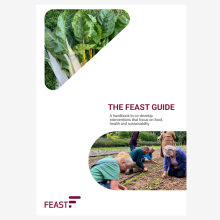
The FEAST Guide
This Guide represents a synthesis of insights and experiences shared by members of the FEAST community between June 2022 and May 2025.
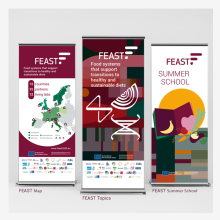
FEAST Banner
These three banner in the size 85 cm x 200 cm are mainly for event communication to highlight the project booth and increate visibility. The download files can be used as printing files.
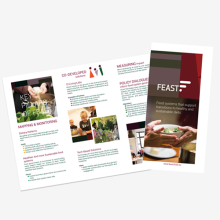
FEAST Project Flyer
The project flyer summarizes the FEAST project and presents a visual overview of its key pillars, highlighting core objectives, research focus, and impact areas. It serves as a quick, engaging snapshot of the project’s goals and structure for all audiences.
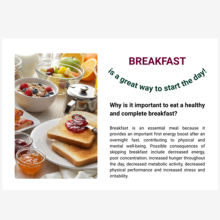
Guide to a healthy breakfast
Compose a healthy, complete and satiating breakfast
This compact guide shares a simple yet impactful method of including a healthy, complete, and satiating breakfast in your everyday life. This method is named as "4-box method," in which each box represents a nutrition category. The guide shares ideas on different food products, which can fit well together to create a 4-box-healthy-breakfast!
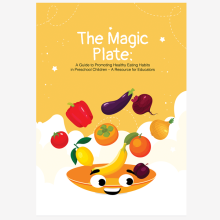
The Magic Plate - a guiding resource for educators
This guide is designed to help preschool staff enhance their knowledge of healthy nutrition. It provides practical activities and resources to promote nutritious eating habits among children and their families. It is created by experts in the fields of nutrition, public health, and child development, along with experienced kindergarten professionals. The guide is prepared within the partnership framework of UNICEF, the Ministry of Labor and Social Policy, and the Association and Consulting of Educators and Learning Communities – Eduland, in collaboration with ARETE – Association for Sustainable Prosperity, and FEAST.
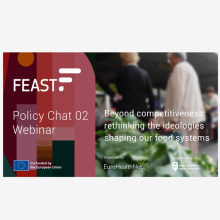
Policy Chat 02 - Webinar Slides
The second Policy Chat webinar wrapped up successfully with extremely interesting talks given by our speakers: Timothy Mark Lang , Anant Jani , and Molly D. Anderson. The three speakers discussed alternatives to the Draghi report’s focus on competitiveness, which prioritizes decarbonization but sidelines health.
Here, we share the webinar slides from this intriguing session – Beyond Competitiveness: rethinking the ideologies shaping our food systems
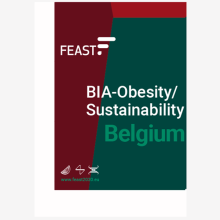
BIA-Obesity and BIA-Sustainability Belgium
This report presents a comprehensive assessment of food companies in Belgium through the BIA-Obesity and BIA-Sustainability frameworks, it reveals significant disparties in both nutrition an sustainability commitments and practices across various sectors, including packaged food manufactures, quick service restaurants, and supermarkets.
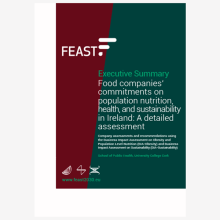
BIA Ireland – Executive Summary
Food companies‘ commitments on population nutrition, health, and sustainability in Ireland: A detailed assessment
This summary presents the key findings of the FEAST report on "Food companies' commitments on population nutrition, health, and sustainability in Ireland". The summary provides a first in-depth insight into the results.
Executive Summary: FEAST - Food companies' commitments on population nutrition, health, and sustainability in Ireland (zenodo.org)
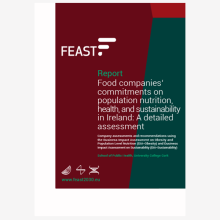
BIA-Obesity and BIA-Sustainability Ireland
Report: Food companies‘ commitments on population nutrition, health, and sustainability in Ireland: A detailed assessment
This report presents the results of Ireland’s first Business Impact assessment on Obesity and Population Nutrition (BIA-Obesity) and Business Impact Assessment on Sustainability (BIA-Sustainability).
The Business Impact Assessments (BIA) were developed by the International Network for Food and Obesity / Non-communicable Diseases Research, Monitoring and Action Support (INFORMAS) to map private sector companies’ commitments and policies as they relate to the food environment.
Report: Food companies‘ commitments on population nutrition, health, and sustainability in Ireland: A detailed assessment (zenodo.org)
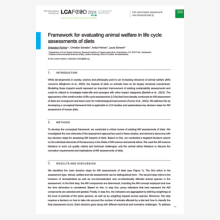
Framework for evaluating animal welfare in life cycle assessments of diets
While developments in society, science, and philosophy point to the increasing relevance of animal welfare (AW) concerns, the impacts of diets on animals have so far largely remained unexamined...
https://orgprints.org/id/eprint/54340/
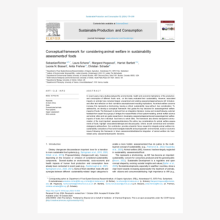
Conceptual framework for considering animal welfare in sustainability assessments of foods
In recent years, many studies analyzed the environmental, health and economic implications of the production and consumption of different foods – and, on this basis, evaluated their sustainability. However, associated impacts on animals have remained largely unexamined and existing assessment approaches are still immature and often lack reflection on their normative assumptions and resulting implications...
https://www.sciencedirect.com/science/article/pii/S2352550924002902?via%3Dihub
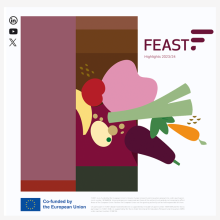
2nd Year Highlights
As FEAST continues to grow, our mission to create meaningful impact advances through a refined strategy, innovative initiatives, and partnerships that reflect our core values. This second-year highlight report demonstrates our growth and commitment to pushing boundaries, promoting sustainable practices, and inspiring change in the European food system on a larger scale. We invite you to download and explore our achievements, ongoing progress, and expanded initiatives. Join us as we build on our foundation, accelerating toward a future where progress and purpose come together.
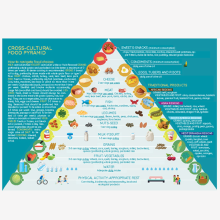
Cross-Cultural Food Pyramid
This source presents a cross-cultural (cc) food pyramid designed to guide children's dietary habits for healthy development. The pyramid encourages a balanced diet rich in fruits, vegetables, whole grains, legumes, and fish while limiting processed foods, sugary drinks, and saturated fats. It highlights the Mediterranean diet as a model for a nutritious and culturally diverse approach, demonstrating how different regions incorporate their own traditional ingredients within the pyramid's framework.
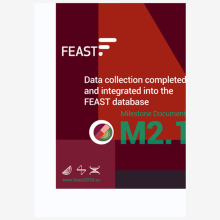
Data collection completed and integrated into the FEAST database
This milestone references the dataset created to achieve Task 2.2 of FEAST WP2 “Explore adherence to and factors influencing healthy/sustainable dietary choices across Europe”. It involved the design of a cross-sectional EU-survey based on a quantitative questionnaire to collect primary data on dietary patterns; purchasing and consumption behaviours; barriers and facilitators to the adherence to healthier and more sustainable diets; and opinions on food system policies, from adult populations across the Europe. FEAST Milestone – Data collection completed and integrated into the FEAST database (zenodo.org)
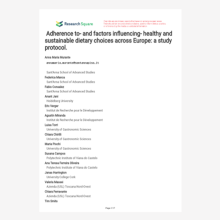
Adherence to- and factors influencing- healthy and sustainable dietary choices across Europe: a study protocol
Current food systems in Europe negatively impact the environment, public health, and the public sector, while favoring large food companies, leading to a “Lose-Lose-Lose-Win” scenario. Moreover, food systems have contributed to health inequalities across the EU, perpetuating disparities in access to healthy and sustainable food...
https://www.researchsquare.com/article/rs-4464994/v1
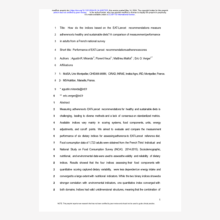
Assessing EAT-Lancet Diet Adherence: A French National Survey Comparison
How do the indices based on the EAT-Lancet recommendations measure adherence to healthy and sustainable diets? A comparison of measurement performance in adults from a French national survey
Measuring adherence to EAT-Lancet recommendations for healthy and sustainable diets is challenging, leading to diverse methods and a lack of consensus on standardized metrics. Available indices vary mainly in scoring systems, food components, units, energy adjustments, and cut-off points. We aimed to evaluate and compare the measurement performance of six dietary indices for assessing adherence to EAT-Lancet reference diet...
https://www.medrxiv.org/content/10.1101/2024.05.14.24307335v1
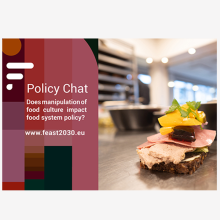
Policy Chat 01 - Webinar Slides
The first ‘Policy Chat’ webinar organised by EuroHealthNet explored how food culture shapes food system policy. The speakers Atsuko Ichijo, Tim Smits, and Lorenzo Bairati gave insights into the often-overlooked influence of food cultures, exploring how traditions evolve through exchange, reflect power dynamics, and even become political tools.
Here, we share the webinar slides – Does manipulation of food culture impact food policy?
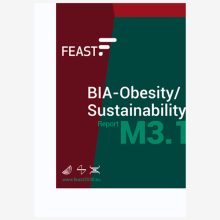
Report on BIA-Obesity/Sustainability
The Business Impact Assessment (BIA) was used on Obesity and BIA Sustainability to conduct a baseline assessment of how businesses affect food environments. Both the BIA-Obesity and the BIA-Sustainability were developed by the International Network for Food and Obesity/NCDs Research, Monitoring and Action Support (INFORMAS) for benchmarking food company policies and practices on population nutrition and sustainability at the national level (Mackay et al., 2022; Sacks et al., 2019). FEAST - Report on BIA-Obesity/Sustainability assessments (zenodo.org)
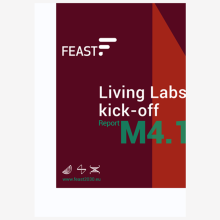
Report on Living Lab Kick-Off
This report describes how FEAST LLs assess local situations regarding challenges related to vulnerable target groups they have identified, features of the relevant food system mapped through SWOTanalyses, and respective kick-off events that brought together those actors that are necessary to codesign and implement solutionsincluding the voices of those affected by the local burning issue related to food security. FEAST - Report on Living Labs kick-off (zenodo.org)
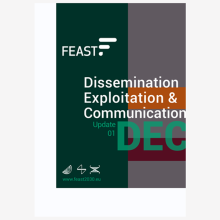
DEC Plan - Update 01
First update of the DEC plan after 18 project months of monitoring and evaluating the DEC activities.
FEAST - Dissemination Exploitation & Communication Plan (update 1) (zenodo.org)
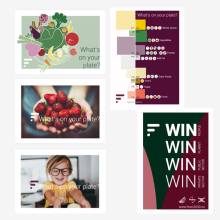
FEAST Postcards
The download package includes four postcards with our message - What's on your plate? The files are ready-to-print files in a DIN A6 horizontal format. These postcards are ideal for students, researchers, and media and communication experts and can be used for communication activities or in presentations.
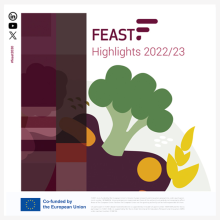
1st Year Highlights
FEAST is not just about accomplishments; it’s about making a meaningful impact. As we marked our 1-year anniversary, its only wise to share this impactful journey with you. This brochure encapsulates FEAST’s initiatives, achievements, and collaborations in the past year. From groundbreaking initiatives at our Living Labs to impactful collaborations, our journey has been nothing short of extraordinary. Download the brochure to explore our first-year highlights, and join us in celebrating a year of achievements and possibilities by spreading the word!
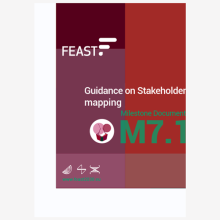
Guidance on Stakeholder mapping
Milestone document M7.1 - Guidance on Stakeholder mapping. A toolbox to tackle frames hindering the transition to healthier and more sustainable food systems. Food systems are extremely complex, and it is too often neglected that topics and concepts involved may not be conceived in the same way by all actors involved. Different stakeholders frame differently even the most fundamental concepts – e.g., sustainability, food security, health, etc. – and these differences may slow down policy implementation and may impede policy formulation. https://www.zenodo.org/record/8272810
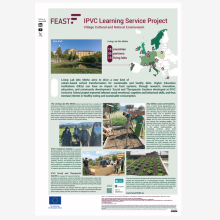
IPVC Learning Service Project
Two conference posters
This project was presented in a poster the NetworkNature annual meeting 2023 conference in Brussels and also at the CLEVER Cities conference in Hamburg. Social and Therapeutic Gardens developed at IPVC Inclusive School project improved relevant social-emotional, cognitive, and behavioral skills, and thus increase interest in healthy eating and sustainable consumption.
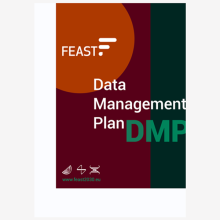
Data Management Plan
“Good data management and stewardship is not a goal in itself, but rather a pre-condition supporting knowledge discovery and innovation”. The structure of the FEAST DMP follows the structure of the template provided by the EU for Horizon Europe projects. This document is the first version of the FEAST DMP; the DMP will be continuously updated during the course of the project. FEAST - Data Management Plan (zenodo.org)
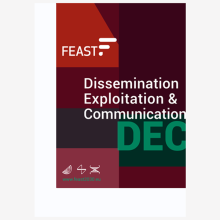
DEC Plan
Efficient and effective Dissemination, Exploitation, and Communication (DEC) will be essential in helping to achieve FEAST’s strategic objectives. The DEC activities will be developed leveraging the full spectrum of knowledge and skills inherent within the FEAST consortium, including partners’ knowledge on cultural differences and norms for European citizens and especially vulnerable groups. FEAST - Dissemination Exploitation & Communication Plan (zenodo.org)
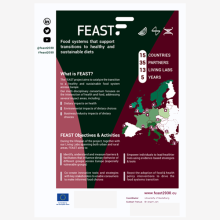
FEAST poster/one-pager
The FEAST one-pager is a poster that summarises the most important facts of the project.
Due to its small format DIN A3, it is easy to produce and can be used with great flexibility even in confined spaces.
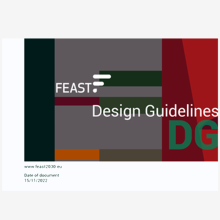
FEAST Design Guidelines
The Design Guidelines (DG) manual summarises the components of the FEAST visual identity. – Version 02 (April 2024)
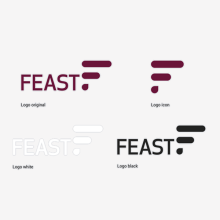
FEAST Logo package
This zip contains the FEAST logo as png, jpg, and svg files.
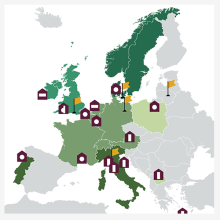
FEAST map overview
The FEAST map shows the locations of our living labs and associated sites in the respective food regions in Europe.
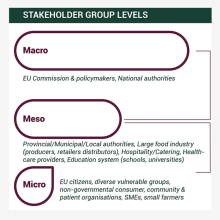
FEAST stakeholder overview
This infographic gives an overview of FEAST activities at the micro, meso, and macro levels and how to address the stakeholders.
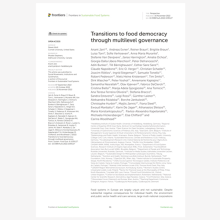
Transitions to food democracy through multilevel governance
Food systems in Europe are largely unjust and not sustainable. Despite substantial negative consequences for individual health, the environment and public sector health and care services, large multi-national corporations continue to benefit from the way food systems are designed—perpetuating “Lose–Lose–Lose–Win” ... https://www.frontiersin.org/articles/10.3389/fsufs.2022.1039127/full